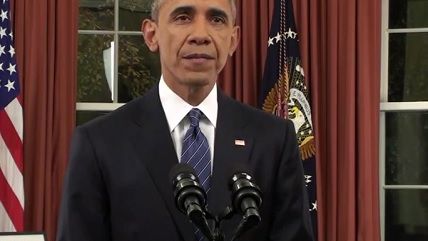Obama's War at Home
Soft power for foreign policy, hard power for domestic affairs.

Republicans have long complained that President Obama does not act like a wartime president. As Texas Sen. Ted Cruz put it shortly after the San Bernardino attack, America is "at a time of war" and "needs a wartime president."
Well, here's some good news: We now have proof that the Obama administration acts as though it were on a wartime footing. Bad news? It's acting that way here at home.
The New York Times reports that the administration broke the law when it used social media to gin up support for a clean-water rule. Through a campaign on Twitter, Facebook, and similar media, it tried to get people to share messages supporting the rule, a practice known as astroturfing (which generates fake, as opposed to real, grass-roots support). The Government Accountability Office, which investigated the campaign, concluded that the EPA engaged in "covert propaganda."
This isn't the first time the administration has tried to use psy-ops against the American people. In its early days, the White House Office of Public Engagement teamed up with the National Endowment for the Arts to encourage artists to produce art supporting the president's initiatives. HHS secretary Kathleen Sebelius warned insurance companies there would be "zero tolerance" for criticism of White House health-care policies.
In foreign affairs, Obama has received considerable praise for emphasizing "soft power"—diplomacy, persuasion, "leading from behind." Indeed, a large part of his 2008 presidential campaign consisted of drawing contrasts between his own approach and the militaristic, trigger-happy approach of the George W. Bush administration. Under Bush, America was a "bully." Under Obama, things would be different.
And they have been! True to his promise, the president made a "new beginning" with Iran. U.S.-Iranian relations would "not be advanced by threats," he vowed, but by "engagement that is honest and grounded in mutual respect." In another speech, the president emphasized the need to "respect Iranian sovereignty." And no matter how truculent, malicious, or deceitful the Iranian regime was, the president stayed at the negotiating table until a nuclear accord was achieved.
But here at home? "President Obama is pressing lawmakers to raise the federal debt ceiling and says he won't be drawn into negotiations," reported The Hill in October. At least he was being consistent: "President Obama on Monday reiterated that he will not negotiate with Republicans over the debt ceiling," reported the Washington Post in 2013. "The president's position is what it is and it won't change," said the White House press secretary.
Abroad, the president is committed to "the advancement of democracy" and sees "the rule of law as a strength, and not an inconvenience." Here at home, he declares: "Wherever and whenever I can take steps without legislation… that's what I am going to do." And so he has—unilaterally upending immigration policy, imperiously rewriting the Affordable Care Act to extend various mandates and imposing new regulations at a breakneck pace.
With regard to terrorism abroad, Obama insisted in February, "We know that military force alone cannot solve this problem." It requires "empowering local communities" and "lift(ing) up the voices" of moderation and working "with the private sector to develop social media tools to counter extremist narratives." And here at home? "To begin with," Obama said after the attack in San Bernardino, Congress should pass more gun-control legislation. Because when you're at war, disarming the hostiles is the first order of business, right?
Obama might favor soft power abroad, but his signature achievement at home, the Affordable Care Act, relies on hard power. The linchpin of the law is the individual mandate, which forces everyone to buy insurance, whether they want to or not—or face increasingly harsh consequences. It is, as many have noted, an unprecedented expansion of government power, and one that squeaked past the Supreme Court only thanks to the intellectual contortions of Chief Justice John Roberts, who concluded that the penalty is both a tax and not a tax at the same time. This year the average fine for not purchasing a policy will approach $1,000 for individuals and as much as $2,000 to $3,000—per employee—for business. And should you politely decline to cough up the dough? Best of luck to you, sir or ma'am.
At present, the Republican primaries are dominated by a neo-fascist who seems to think he can "Make America Great Again" by breaking all the rules of normal American politics and imposing his will on everyone else by whatever means he thinks most expedient. Democrats are right to be horrified by Donald Trump—but they should pause to ask where he could have gotten such an idea.
This article originally appeared at the Richmond Times-Dispatch.


Show Comments (22)